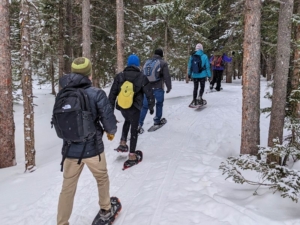The Mental Health Benefits of Snowshoeing
 Being in nature always provides an opportunity to slow down, breathe deeper, and open up to the beauty of our surroundings and the world at large.
Being in nature always provides an opportunity to slow down, breathe deeper, and open up to the beauty of our surroundings and the world at large.
“When we embark on a hike we must attune our senses to the world around us,” says Peter Kamback, a vocational rehabilitation specialist and community organizer for Colorado Recovery. “There is so much on which to focus our attention that it becomes harder to focus our mental attention on ourselves, our problems, and our concerns.”
This is especially true in the Colorado winter when you’re traversing the snow-covered landscape on snowshoes. “We must be careful where to place each step in front of us,” Kamback reminds us. “We also must be aware of others in our group. And from time to time we may be able to appreciate the beauty of our natural surroundings.”
While a Rocky Mountain winter landscape might seem daunting to some, when navigating the complexities of mental health conditions like schizophrenia, bipolar disorder, or anxiety, strapping on snowshoes can offer a path to healing and empowerment.
“In the realm of mental health treatment, nature-based therapies have gained significant recognition for their profound impact on emotional well-being,” explains Colorado Recovery’s executive director Terry Stiven. “Snowshoeing, in particular, presents a unique
opportunity for our clients to immerse themselves in the beauty and peacefulness of winter landscapes.”
“It’s important to get people out of their comfort zone,” she says. “Many of our clients have not seen these kinds of mountains before, so some of them get a little nervous and wonder ‘What if I can’t do this?’ It’s a great opportunity to work on any anxiety or fears they may have.”
It’s not only the snowshoeing itself—clients also learn to prepare and organize for the trip. It’s about getting out of the house and not only for an hour-long therapy session but pretty much for the whole day.
“We must prepare for the cold temperature, the conditions of the trail, the weather, and to some extent the unknown of what will be experienced,” says Kamback. “This preparation includes physical accommodations such as the snowshoe equipment and proper attire, but also some mental preparation for the environment we will encounter.”
Great skills to develop for anybody. “Taking these steps helps us prepare for what we may encounter and experience in our lives,” explains Kamback. “These trips are a great way to employ the courage to accept a challenging situation. As fun and rewarding as a snowshoeing excursion may be, it is also a challenging experience. We can gain a sense of accomplishment from these experiences.”
Snowshoeing offers many physical and mental health benefits. It promotes cardiovascular health, improves balance and coordination, and strengthens muscles and endurance. And most importantly, it offers a respite from the constant chatter of the mind.
“For those battling mental illness, feelings of isolation and alienation can be overwhelming,” explains Stiven. “Snowshoeing on the other hand can foster a sense of community and connection. It allows everyone to share their experiences, support one another, and form meaningful connections. Snowshoeing is not merely a leisurely activity, it is an adventure that challenges our clients to push beyond their comfort zones and discover their inner strength. The sense of accomplishment can be life-changing.”
Being part of a group means looking out for one another. “We remember that we are part of something larger than ourselves,” says Kamback. “Perhaps we would not endeavor to challenge ourselves on our own, but comfort and support come with group activities. We also have the chance to notice others enjoying themselves; becoming relaxed and opening up.”
Hiking with or without snowshoes is a wonderful exercise—for body and mind.
“These trips are a great way to boost mental fortitude and build up self-confidence,” says Kamback. “Clients may find new interests to pursue or new skills to develop. It can come as a great comfort to know that in the chaos of our lives, we have the option to slow down and recognize that there is beauty in the world and that there are meaningful things worth doing.”
At Colorado Recovery, it is our mission to help adults with serious mental health issues stabilize their illness, minimize symptoms, improve functioning, and enhance each person’s social inclusion, quality of life, and sense of meaning in life. In an atmosphere of caring support, clients learn about their condition and how to live successfully with it in a supportive environment.
If you have questions about our services to treat schizophrenia, bipolar disorder, and similar mental illnesses, call us at 720-218-4068 to discuss treatment options for you or the person you would like to help.





